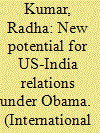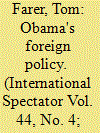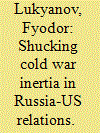| Srl | Item |
| 1 |
ID:
092998


|
|
|
|
|
| Publication |
2009.
|
| Summary/Abstract |
As Italian policymakers argue about the best way to respond to the global economic crisis, the importance of the euro to Italian economic stability seems to have dropped out of the debate. This is a problem for three reasons: it dulls the memory of Italian efforts to get into the single currency in the mid-to-late 1990s; it allows critics of the euro to shape perceptions of how eurozone membership affected Italy during the past decade; and it obscures the trade-offs that Italians would face if they were to make different choices in the future -- including the choice to leave. As a result, while it has been relatively easy to argue that Italian politicians would have to be crazy to try to take Italy out of the euro, it may become more difficult to make that case with the same level of confidence as time goes on. Italian perceptions of the merits of being in the euro are changing and the real possibilities available to Italian policymakers are changing as a result. Italy will pay a high price for opening up the possibility of leaving the eurozone whether or not Italian policymakers are serious about taking that step.
|
|
|
|
|
|
|
|
|
|
|
|
|
|
|
|
| 2 |
ID:
092997


|
|
|
|
|
| Publication |
2009.
|
| Summary/Abstract |
Many in India feared that the burgeoning US--India relationship would collapse under President Obama, but his policies so far have alleviated these concerns. The US has not tried to mediate in Kashmir, has gone ahead on the civil nuclear energy agreement, and entered into a high-level strategic dialogue with India. The biggest potential thorn in US--India relations could be the US approach to Pakistan: Obama could be tempted to tolerate a military-dominated Pakistan and, in order to enable a speedy exit from Afghanistan, could seek a Chinese guarantee in Afghanistan and (indirectly) Pakistan. This would have serious consequences for India and would bring back bitter memories of US instrumentalism in South Asia.
|
|
|
|
|
|
|
|
|
|
|
|
|
|
|
|
| 3 |
ID:
092993


|
|
|
|
|
| Publication |
2009.
|
| Summary/Abstract |
Barack Obama's first year should appear disappointing only to persons blind to the constraints imposed by the Bush legacy, the still reeling world economy, an intimidating agenda of domestic problems, a polarised domestic politics, and at least temporarily intractable opponents of the President's undoubted ambitions to tame the Middle East and promote cooperation among the leading states without jettisoning a commitment to liberal values. By ordering an end to torture and moving to close Guantanamo, he has signalled the restoration of moral restraint on the exercise of American power and implicitly expressed belief in the efficacy of soft power assets. Additionally, he has attempted to create political space for change by pushing the conventional limits of American presidential discourse. A decent start, but the hard part lies ahead.
|
|
|
|
|
|
|
|
|
|
|
|
|
|
|
|
| 4 |
ID:
092995


|
|
|
|
|
| Publication |
2009.
|
| Summary/Abstract |
Obama's declared approach of taking account of the views of other countries, reliance on multilateral institutions and consensus diplomacy will help to reshape Russian--US relations. The recent dialogue on strategic offensive armaments could well be the spark that will ignite the engine of Russian--American interaction on a wide range of issues. It is increasingly clear, however, that ideologies and nuclear arms will not be the driving forces of world politics in the 21st century. Under these circumstances, Russia can be either an opponent or a partner for Washington. Previously, the main problem in their relationship was the US' unwillingness to sacrifice any of its interests, even secondary ones. A new Russian--US partnership could be built on the similarities in their foreign policy priorities - their focus on regional conflicts and the need for stability in Eurasia.
|
|
|
|
|
|
|
|
|
|
|
|
|
|
|
|